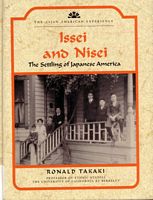
Issei and Nisei: The Settling of Japanese America (1994)

One of the arguments that was used against Japanese Americans in the WWII years was they they either refused or were incapable of assimilating in to American culture.
The argument ignored that fact that, for one thing, the Issei, the first generation settlers, were banned from becoming US citizens. The type of prejudice, hatred and discrimination the Japanese Americans encountered encouraged them to bond together even more strongly. The book writes:
”Ethnic solidarity encouraged the Japanese to rely on themselves and on each other. Issei gave each other jobs and loans and supported each others' businesses. Kept out of factories and skilled trades by the hostility of white workers, many Issei became entrepreneurs. They went into business for themselves as shopkeepers and farmers.
”But the very success of their ethnic economy hurt the Japanese, who were caught in a vicious cycle. When they retreated into their self-contained ethnic communities for survival and protection, they were accused of not wanting to fit into America. Their withdrawal into their Japanese communities made it even easier for the whites to look upon them as outsiders, as 'strangers from a different shore.'”
Specific examples of the prejudice are given, such as a sign that says “No More Japs Wanted Here”, and a barber shop that said to Japanese “We don't cut animal's hair.”
”In 1890 fifteen Japanese workers began making shoes for a white manufacturer in San Francisco, but they lost their jobs because of pressure from the Book and Shoemakers's White Labor League.”
Even the head of the AFL, Samuel Gompers, said “Your union will under no circumstances accept membership of any Chinese or Japanese” when addressing the American Federation of Labor.
In 1901 the governor of California warned about the “menace” of the “unlimited flow” of Japanese workers. The Asiatic Exclusion League was formed just a few years later, its goal to keep America white by using “all possible measures to prevent or minimize the immigration of Asiatics to America.”
The book notes that President Theodore Roosevelt publicly spoke out in favor of the Japanese Americans, especially in relation to the attempt of the San Francisco school board to discriminate against them, but in private he felt America should be preserved as “a heritage for the white people.”
The book contains lots more information; those were just some of the things that I felt were the most interesting.
Main Index
Japan main page
Japanese-American Internment Camps index page
Japan and World War II index page
|